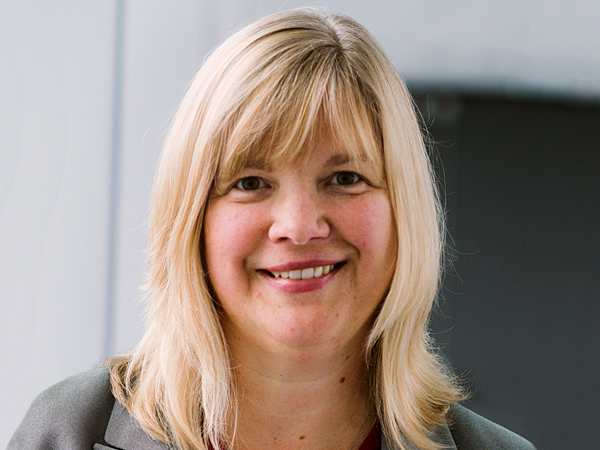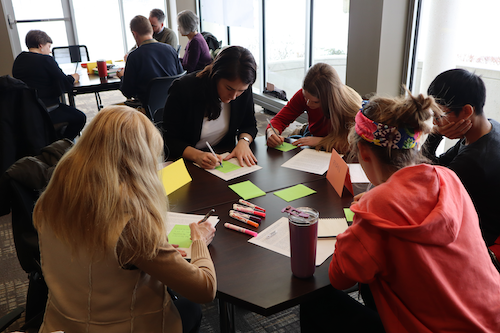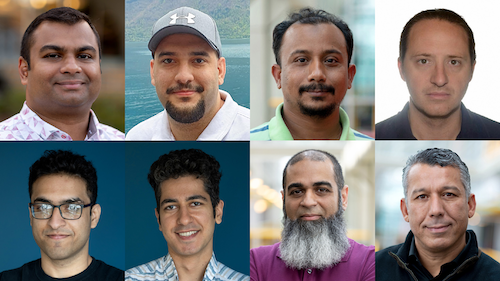Editor:
Brandon Sweet
University Communications
bulletin@uwaterloo.ca
2021 Outstanding Performance Award recipients announced
The Office of the Vice-President, Academic & Provost has announced the winners of the 2021 Outstanding Performance Awards.
Arts
Katherine Acheson; Ramona Bobocel; Jennifer Clary-Lemon; Tara Collington; Martin Cooke; Tara Cooper; Michael Dixon; Anna Esselment; Riemer Faber; Myra Fernandes; Steve Fortin; Andrea Jonahs; George Lamont; Shana MacDonald; Emmett Macfarlane; Patricia Marino; Nicole Nolette; Abigail Scholer; Imre Szeman; Nancy Vanden Bosch; Paul Wehr; and Sarah Wilkins-Laflamme.
Engineering
Hossein Abouee Mehrizi; Marc Aucoin; Kankar Bhattacharya; David Clausi; Kamyar Ghavam; Robert Gracie; Parsin Haji Reza; Carol Hulls; Marc Hurwitz; Bruce MacVicar; Jane Mah Hutton; Stewart McLachlin; Sarah Meunier; Christine Moresoli; Kevin Musselman; Mohammed Nassar; Siva Sivoththaman; Scott Walbridge; Zbigniew Wasilewski; Christopher Wilson; Wei-Chau Xie; Alfred Yu; and Jeffrey Zarnett.
Environment
Richard Kelly; Brendon Larson; Leia Minaker; Markus Moos; Stephen Murphy; Su-Yin Tan; Andrew Trant; and Michael Wood.
Health
Jack Callaghan; Mark Ferro; George Heckman; Ellen MacEachen (Stothers); Monica Maly; and Katie Misener.
Math
Andrew Beltaos; Sue Ann Campbell; Benoit Charbonneau; Robin Cohen; Khuzaima Daudjee; Ian Goldberg; Kevin Hare; Jesse Hoey; Florian Kerschbaum; Emily Kozlowski; Jimmy Lin; Eduardo Martin-Martinez; Stephen New; Martin Pei; John-Paul Pretti; Victoria Sakhnini; David Saunders; Alexander Schied; Sean Speziale; David Tompkins; Stephen Vavasis; and Changbao Wu.
Science
Monica Barra; Nandita Basu; Karen Cummings; Jean Duhamel; Andrea Edginton; Richard Epp; Laura Hug; Laura Ingram; Sarah MacIver; Will Percival; Cynthia Richard; Rebecca Rooney; Sarah Ruffell; Andre Stanberry; and Christopher Yakymchuk
"I am very pleased to announce the award recipients for 2021 and would like to take this opportunity to congratulate them for their outstanding contributions to the University of Waterloo," wrote Vice-President, Academic & Provost James Rush in a statement released last week.
Effective May 1, 2005, in accordance with the 2003 Faculty Salary Settlement, the University of Waterloo established an Outstanding Performance Fund to reward faculty members for outstanding contribution in teaching and scholarship.
Donna Ellis named president-elect of International Consortium for Educational Development
A message from the Centre for Teaching Excellence.

Centre for Teaching ExcellenceDirector Donna Ellis has been announced as the next President-Elect of the International Consortium for Educational Development. She recently sat down with a colleague in the CTE for an interview about this new position.
Donna, you’ve just been named as the President-Elect of the International Consortium for Educational Development. Congratulations and tell us about that organization.
The International Consortium for Educational Development — ICED(pronounced i-ced), for short — is a kind of “meta” organization. Started in 1993, it supports collaboration among educational development networks around the world. For example, Canada’s STLHE is a member, and so is the POD Network in the US, SEDA in the UK, and INCATHE in Israel. In total, there are 27 member networks from all around the world. The members of these networks share resources and learn from one another.
How do its member networks support each other?
One main way is the biennial ICED conference where there are lots of workshops, research sessions, and networking opportunities. In fact, I just returned from the 2022 conference in Aarhus, Denmark, where I co-facilitated a workshop on human resources management in teaching centres. Another way is through its publication, the International Journal for Academic Development.
So ICED is a consortium for educational development – and what’s educational development?
Essentially, educational development (ED) is about helping post-secondary institutions become the best teaching and learning communities they can be. To do this, those in teaching centres work at different levels — individual, departmental, and institutional — to promote capacity building, community building, and an institutional culture that promotes and enables effective teaching and meaningful learning. The heart of the work revolves around individual and institutional change.
What drivers influence educational development?
Educational developers always strive to address instructors’ needs by providing guidance and resources that fit with learning science and with institutional priorities, which are influenced by evolving societal contexts. But how those priorities manifest themselves around the world can look different. For example, in Canada they currently include equity, diversity, inclusion, Indigenization, anti-racism, and sustainability. Elsewhere, equitable access to learning technologies might be a priority, or the quality of education, or engagement with democracy and human values. The consistent aspect is that we’re always adapting our programs, services, and resources to help instructors teach effectively and prepare their students for contemporary issues and challenges. Just like instructors and students, we too are constantly learning!
Why did you decide to pursue this leadership role with ICED?
For me personally, it’s such an exciting growth opportunity! I look forward to having a lot of my professional assumptions challenged, and learn more about how educational development is done in other parts of the world. I believe I bring significant experience and skills to the role, too. For example, when I was POD Network president, I put a lot of emphasis on increasing the flow of information to, from, and amongst members to enhance transparency, inclusion, and engagement. ICED's member networks’ needs are evolving, and I am committed to helping the organization make changes to meet those needs. I’m also confident that I’ll glean ideas from this experience that can inform future directions for teaching and learning here at Waterloo. So, all in all, I’m eager to give back to the broader community of educational developers, to learn more from them, and to use that new learning to help make Waterloo an even greater place to teach and learn.
Donna will serve as President-Elect of ICED till summer of 2023 and then as President until 2025. Her candidate statement for this position is available online.
Summer cohort now open for Mental Health Literacy Program

A message from Campus Wellness.
In 2021, Campus Wellness launched the Mental Health LiteracyProgram for faculty and staff, in response to recommendations from the President’s Advisory Committee on Student Mental Health. Over the course of six-modules, the program encourages discussion and reflection on mental health through an equity-focused lens and empowers participants to build a supportive community of care, concern, and compassion.
The program is underpinned by 12 competencies needed to create a baseline level of mental health literacy, which in turn, helps reduce stigma and encourages help-seeking behaviours. These competencies fit within 6 categories that include: responding to a person in distress, accessing resources and supports, understanding the barriers to mental health, self-management, self-advocacy, and communication.
UWaterloo employees that have completed the program thus far have commented that it is comprehensive and easily applicable to their work. It provides a safe space for mental health conversations while prompting critical thinking about UWaterloo culture and systems. Participants will also walk away with strategies for incorporating self-care when supporting others.
If you’re interested in signing up for the summer cohort or learning more about the program, please visit Campus Wellness’ training page.
Computer Science researchers win three awards at NOMS 2022

This is an excerpt of an article published originally on the Cheriton School of Computer Science website.
The 18th IFIP/IEEE Network Operations and Management Symposium (NOMS 2022) held in Budapest, Hungary explored network and service management in the era of cloudification, softwarization, and artificial intelligence as its main theme.
Several systems and networking researchers from the Cheriton School of Computer Science along with their national and international colleagues attended the week-long symposium to present their research, winning three awards in total — a best dissertation award, a best student paper award, and a best paper award.
NOMS 2022 Best Dissertation Award
Shihab Chowdhury received the NOMS 2022 Best Dissertation Award for his PhD titled “Resource management in softwarized networks.” Shihab conducted doctoral studies in the Systems and Networking group, under the supervision of Raouf Boutaba, Professor and Director of the Cheriton School of Computer Science.
NOMS 2022 Best Student Paper Award
PhD student Soheil Johari received the NOMS 2022 Best Student Paper Award for “Anomaly detection and localization in NFV systems: an unsupervised learning approach,” research he conducted with his doctoral advisor Raouf Boutaba and colleagues Nashid Shahriar, Massimo Tornatore and Aladdin Saleh.
NOMS 2022 Best Paper Award
Muhammad Sulaiman, Arash Moayyedi, Mohammad A. Salahuddin and Raouf Boutaba from the Cheriton School of Computer Science, along with Aladdin Saleh from Rogers Communications Canada, received the NOMS 2022 Best Paper Award for “Multi-agent deep reinforcement learning for slicing and admission control in 5G C-RAN.”
Read the full article on the Computer Science website.
Thursday's notes
A Retirement Open House for Linda Beaulieu, who has served at the University for 23 years, will be held Thursday, June 23, 2022 from 12:00 p.m. to 2:00 p.m. in E2-1772.

As part of the Institute for Quantum Computing's 20th anniversary Quantum Perspectives: A Panel Series, IQC will be hosting the next installment, Quantum Perspectives: Communication on Tuesday, June 21 at 12 noon on YouTube.
"Communication networks are an essential part of our world today, used in transactions from banking to education, global business exchanges to defence," says the talk's background. "What happens when our private information is no longer private? Powerful quantum computers will have the ability to crack the encryption of public keys that we currently use to secure our data, putting our privacy at risk. Through the study of quantum communication, researchers are developing quantum-safe cryptography protocols along with ultra-secure communication channels and global quantum networks."
Panelists include:
- Katanya Kuntz, Research Associate, IQC and QEYSSat Science Team Coordinator
- Sara Zafar Jafarzadeh, Research Fellow, IQC and Cryptographer, Synopsys Inc.
- Dave Touchette, Professor, Institut Quantique, Université de Sherbrook
Join the conversation online on Tuesday, June 21 at 12:00 p.m. live on YouTube.
Link of the day
When and Where to get support
Students can visit the Student Success Office online for supports including academic development, international student resources, immigration consulting, leadership development, exchange and study abroad, and opportunities to get involved.
Instructors looking for targeted support for developing online components for blended learning courses, transitioning remote to fully online courses, revising current online courses, and more please visit Agile Development | Centre for Extended Learning | University of Waterloo (uwaterloo.ca).
Instructors can visit the Keep Learning website to get support on adapting their teaching and learning plans for an online environment.
Course templates are available within your course in LEARN to help you build and edit your content and assignment pages quickly.
The following workshops, webinars, and events are offered by the KL team (CTE, CEL, ITMS, LIB):
-
Scholarship of Teaching and Learning (SoTL) Methods – self-directed, continuous self-enrollment course in LEARN.
-
Independent Blended Course Design (iBlend) - self-directed, continuous self-enrollment course in LEARN.
-
Copyright Overview for Waterloo Instructors and Staff - self-directed, continuous self-enrollment course in LEARN.
-
Independent Remote Course Design Essentials (iReCoDE)- self-directed, continuous self-enrollment course in LEARN.
-
Supporting Student Mental Health (for Instructors) – self-directed, continuous self-enrollment course in LEARN.
-
SoTL Stories, June 15, 1:00 p.m. to 2:00 p.m.
Supports are available for employees returning to campus. Visit IST’s Hybrid Work and Technology guidelines and workplace protocols to assist with the transition.
The Writing and Communication Centre has virtual services and programs to help undergrads, grad students, postdocs and faculty members with academic writing.
- Meet with writing advisors in one-to-one appointments to brainstorm, draft, revise, and polish. No time for an appointment? Try email tutoring for undergrads.
- Beat isolation and make writing progress at weekly Virtual Writing Cafés for grad students and faculty or PJ-Friendly Writing Groups for Undergrads.
- Take an online workshop or apply to our popular Dissertation Boot Camp program.
- Faculty can request custom in-class workshops for their courses, or the WCC can facilitate any existing workshops for student groups.
- Course-integrated support available. Attention faculty and instructors: The application form for Writing and Communication Centre course-integrated support is now available online. We offer five unique support streams for your courses including synchronous and asynchronous workshops and monitored discussion boards.
Co-op students can get help finding a job and find supports to successfully work remotely, develop new skills, access wellness and career information, and contact a co-op or career advisor.
The Centre for Career Action (CCA) has services and programs to support undergrads, grad students, postdocs, alumni, and employees in figuring out what they value, what they’re good at, and how to access meaningful work, co-op, volunteer, or graduate/professional school opportunities. Questions about CCA's services? Live chat, call 519-888-4047, or stop by our front desk in the Tatham Centre 8:30 a.m. to 4:30 p.m., Monday to Friday.
Drop-in to Warrior Virtual Study Halls on Wednesdays from 5:30 p.m. to 7:00 p.m. Come together in this virtual space to set goals and work independently or in groups each week.
Renison's English Language Institute continues to offer virtual events and workshops to help students practice their English language skills.
If you feel overwhelmed or anxious and need to talk to somebody, please contact the University’s Campus Wellness services, either Health Services or Counselling Services. You can also contact the University's Centre for Mental Health Research and Treatment. Good2Talk is a post-secondary student helpline available to all students.
The Library is open with expanded hours for access to book stacks, drop-in individual study space, bookable group study rooms, drop-in access to computers and printers, book pick-up services and IST Help Desk support. Librarian consultations, Special Collections & Archives and the Geospatial Centre are available by appointment. Full details on current services and hours are available on the Library’s COVID-19 Update webpage.
The Faculty Association of the University of Waterloo (FAUW) continues to advocate for its members. Check out the FAUW blog for more information.
The University of Waterloo Staff Association (UWSA) continues to advocate for its members. Check out the UWSA blog for more information.
The Sexual Violence Prevention and Response Office (SVPRO) supports all members of the University of Waterloo campus community who have experienced, or been impacted, by sexual violence. This includes all students, staff, faculty and visitors on the main campus, the satellite campuses, and at the affiliated and federated Waterloo Institutes and Colleges. For support, email: svpro@uwaterloo.ca or visit the SVPRO website.
The Office of Indigenous Relations is a central hub that provides guidance, support, and resources to all Indigenous and non-Indigenous campus community members and oversees the University's Indigenization strategy.
The Waterloo Indigenous Student Centre, based at St. Paul’s University College, provides support and resources for Indigenous students, and educational outreach programs for the broader community, including lectures, and events.
WUSA supports for students:
Peer support - MATES, Glow Centre, RAISE, Women’s Centre - Visit https://wusa.ca/services/wusa-peer-support to book an appointment either in person or online for the Fall term.
Food Support Service food hampers are currently available from the Turnkey Desk 24/7 in the Student Life Centre. Drop off locations are also open again in SLC, DC, DP, SCH and all residences.
Co-op Connection all available online. Check https://wusa.ca for more details.
Centre for Academic Policy Support - CAPS is here to assist Waterloo undergraduates throughout their experience in navigating academic policy in the instances of filing petitions, grievances and appeals. Please contact them at caps@wusa.ca. More information is available.
WUSA Student Legal Protection Program - Seeking legal counsel can be intimidating, especially if it’s your first time facing a legal issue. The legal assistance helpline provides quick access to legal advice in any area of law, including criminal. Just call 1-833-202-4571.
Empower Me is a confidential mental health and wellness service that connects students with qualified counsellors 24/7. They can be reached at 1-833-628-5589.
GSA-UW supports for graduate students:
The Graduate Student Association (GSA-UW) supports students’ academic and social experience and promotes their well-being.
Advising and Support - The GSA advises graduate students experiencing challenges and can help with navigating university policies & filing a grievance, appeal, or petition.
Mental Health covered by the Health Plan - The GSA Health Plan now has an 80 per cent coverage rate (up to $800/year) for Mental Health Practitioners. Your plan includes coverage for psychologists, registered social workers, psychotherapists, and clinical counselors.
Dental Care - The GSA Dental Plan covers 60 to 70 per cent of your dental costs and by visiting dental professionals who are members of the Studentcare Networks, you can receive an additional 20 to 30 per cent coverage.
Student Legal Protection Program - Your GSA fees give you access to unlimited legal advice, accessible via a toll-free helpline: +1-833-202-4571. This advice covers topics including housing disputes, employment disputes, and disputes with an academic institution.
The Graduate House: Open Monday to Tuesday 11:30 a.m. to 7:00 p.m. and Wednesday to Friday 11:30 a.m. to 9:00 p.m. We’re open to all students, faculty, staff, and community members. The Graduate House is a community space run by the GSA-UW. We’re adding new items to the menu. Graduate students who paid their fees can get discounts and free coffee.
When and Where (but mostly when)
Warriors vs. Laurier Blood Donation Battle. Join our “Waterloo Warriors” team on the Blood.ca website or app. #ItsInYouToGive
TD Walter Bean Visiting Professorship: faculty & graduate student meetings, Monday, June 6 to Friday, June 10.
Building Respectful Research Relationships with Indigenous Communities Webinar, Indigenous History Month 2022, Thursday, June 9, 12:00 p.m.
Brubacher House Artist-in-Residence Workshops, "June Art Classes with Yulia Balobanova," Saturday, June 11, 3:30 p.m., BRH (Brubacher House, North Campus), for kids ages 6-10.
UW Staff Board Foundations workshop via MS Teams Session 003, Tuesday, June 14 from 11:30 a.m. to 1:30 p.m., Session 003 registration link.
NEW - Water ecosystem service valuation for watershed security – information gaps and policy needs, presented by Marian Weber. Part of the Water Institute's webinar series: The Value of Water in Canada, Wednesday, June 15, 12:00 noon.
NEW - Distinguished Lecture Series, “A Personal and Historical View of Computational Mathematics,” featuring Tony Chan, President, King Abdullah University of Science and Technology, Wednesday, June 15, 2:00 p.m., DC 1302. Also live streamed.
PhD oral defences
Computer Science. Chang Ge, "Private Data Exploring, Sampling, and Profiling." Supervisor, Ihab F. Ilyas. Oral defence Tuesday, June 7, 11:00 a.m.
Recreation and Leisure Studies. Narges Abdeahad, "The Role of Campus Recreational Sports Participation in Predicting Students’ Psychological Wellbeing during the Covid-19 Pandemic: A Goal Orientation Approach". Supervisor, Steven Mock. Email Health Graduate Administration for a copy. Oral defence Thursday, June 9, 10:00 a.m.
Computer Science. Jiayi Chen, "Adaptive User Authentication on Mobile Devices." Supervisor, Urs Hengartner. Thesis available from MGO - mgo@uwaterloo.ca. Oral defence Thursday, June 9, 2:00 p.m.